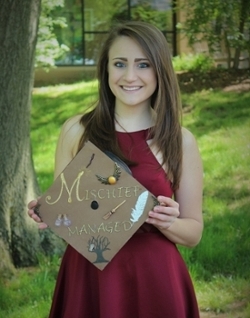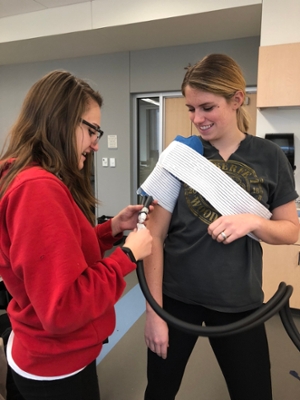Clinical Fieldwork Helps Student Discern Her Career Path

Sarah Leavy, ’19, G’20, was nervous before her summer-long clinical experience in the University’s occupational therapy program.
She would be working full-time at a psychiatric hospital, in between her fourth and fifth years of the program.
“You’re becoming an OT for the summer, for the very first time, with actual clients,” Leavy said. “You’re basically seeing if you have the criteria to be an OT.”
But the support of both the on-site supervisors at the hospital and her Scranton fieldwork coordinators helped her prepare, calm her nerves, and make the most of the experience.
“Going into it, throughout it, and after it—through the whole experience—they’re there for you. I got to take all the skills, knowledge, and abilities that Scranton gave me and mix it up with my style of treatment. It was awesome seeing people progressively get better throughout the weeks I was there,” said Leavy, of Wanaque, NJ.

Fieldwork Shows Students All Aspects of Occupational Therapy
Occupational therapists care for people with physical, developmental, or emotional challenges in a variety of settings. It could be inpatient hospital or nursing home rehabilitation or outpatient rehabilitation, physical recovery or mental health settings, for children or adults.
In previous fieldwork before the psychiatric hospital, Leavy worked at a school for children with special needs, a psychiatric inpatient facility and a post-surgery rehab facility. At each one, she was able to hone in on what she enjoys most — working with children and working in a psychiatric setting — and rule out what didn't appeal to her. Leavy is small in stature and found physical rehab settings difficult, depending on the size and height of the patient she was assisting.
Putting Creativity to Work
“I made a packet for them with funny—and appropriate—jokes and then I had them write in a journal, a laughing diary, any time something made them laugh or was funny to them,” she said. “We shared [what made them laugh] with the group, and then I explained how using humor can be a great way to look at things from the bright side, [even with] the really serious stuff they’re going through. It was a fun day; I had everyone laughing.”
During her summer at the psychiatric hospital, Leavy used skills from her Occupational Performance class to create a “Jeopardy!” game for a small group discussion about food preparation and nutrition. She started the session to see how much they knew about nutrition, and ended it with another round to gauge how much they had learned.
“In Occupational Performance, we take activities and break them down step by step and see where we can upgrade or downgrade an activity to make it harder or easier for an individual, finding just the right challenge,” she said. “That took me so far in this fieldwork, because they wanted me to be creative and come up with different ways to do things.”
Praise for Scranton
Outside of her studies, she has been active with Campus Ministries, service trips and the Liva Arts Company theater group. These opportunities for a well-rounded college experience are why she chose Scranton.
“If you’re looking for a strong community, if you’re looking to do service, if you’re looking to better your education and better people’s lives, I would look at Scranton as your choice—it’s an amazing place,” Leavy said.
“Scranton not only validated the feeling that being an OT is right for me, but it also gave me the confidence to say, ‘I can do this, I can be an OT.’”